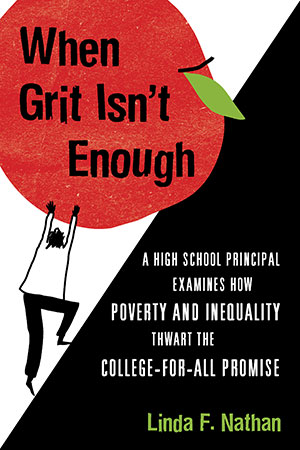
A High School Principal Examines How Poverty and Inequality Thwart the College-for-All Promise
Examines major myths informing American education and explores how educators can better serve students, increase college retention rates, and develop alternatives to college that don’t disadvantage students on the basis of race or income
Each year, as the founding headmaster of the Boston Arts Academy (BAA), an urban high school that boasts a 94 percent college acceptance rate, Linda Nathan made a promise to the incoming freshmen: “All of you will graduate from high school and go on to college or a career.” After fourteen years at the helm, Nathan stepped down and took stock of her alumni: of those who went to college, a third dropped out. Feeling like she failed to fulfill her promise, Nathan reflected on ideas she and others have perpetuated about education: that college is for all, that hard work and determination are enough to get you through, that America is a land of equality.
In When Grit Isn’t Enough, Nathan investigates five assumptions that inform our ideas about education today, revealing how these beliefs mask systemic inequity. Seeing a rift between these false promises and the lived experiences of her students, she argues that it is time for educators to face these uncomfortable issues head-on and explores how educators can better serve all students, increase college retention rates, and develop alternatives to college that don’t disadvantage students on the basis of race or income.
Drawing on the voices of BAA alumni whose stories provide a window through which to view urban education today, When Grit Isn’t Enough helps imagine greater purposes for schooling.
Buy the book!
Find it at a local independent bookstore: IndieBound
Testimonials:
“It’s a marvelous book, and badly needed at this time. Drawing on the powerful stories of children at the Boston Arts Academy, Linda Nathan bravely confronts the widely circulated myth that children who grow up in poverty can overcome inequity and every other daunting obstacle they face if they just ‘believe,’ ‘persevere,’ ‘work like hell,’ and show sufficient ‘grit.’ Many of these students do prevail, but Nathan makes it clear that ‘grit’ is not enough and that our adherence to this appeasing myth is letting a divided and bitterly unequal social order off the hook.”
—Jonathan Kozol, author of Savage Inequalities: Children in America’s Schools
“Supporting students throughout college is as important as supporting them in high school—especially as students confront challenges connected to race and class. Linda Nathan deftly describes the kind of team effort that is required of educators in order to ensure student success.”
—Deborah Bial, president and founder of the Posse Foundation
“Storytelling can serve as a powerful tool for truth telling. Linda Nathan’s When Grit Isn’t Enough is truth telling at its best! Drawn on over thirty years of teaching and leading in public education settings, Linda’s stories show us, in no uncertain terms, how five long-held assumptions about American education are hurting thousands of talented urban students. Through stories, Linda exposes us to painful truths and provides us with practical, implementable, and replicable solutions that can reverse these long-standing false assumptions. Most of all, she leaves us with hope, inspiration, and direction.”
—Jackie Jenkins-Scott, president emeritus, Wheelock College, Boston
“In When Grit Isn’t Enough, veteran educator Linda Nathan gives the lie to five popular but unproven beliefs about education that do little to improve schooling but instead blame the victims of poor and unequal schooling. This is a courageous book, one that challenges all of us, educators and non-educators alike, to do better for our most vulnerable students.”
—Sonia Nieto, professor emerita of Language, Literacy, and Culture, College of Education, University of Massachusetts, Amherst
“Insightful, revealing, and at times heart-wrenching, this book is an invaluable resource for those who hope to use education to transform the lives of our most vulnerable youth.”
—Pedro A. Noguera, PhD, Distinguished Professor of Education, UCLA Graduate School of Education and Information Studies
“When Grit Isn’t Enough does a brilliant job of dismembering the prevailing fallacies about what makes for student success in higher education. Seamlessly weaving together stories and analysis, veteran educator Linda Nathan shows how, for poor, minority, and first-gen students, money (more precisely, the lack of money) and race do matter, and how it’s fatuous to tell students on the cusp that, to make it, all they have to do is buckle down. When Grit Isn’t Enough is both a powerful indictment of higher education and a blueprint for reform. If you read one book on education this season, make it this one.”
—David L. Kirp, Professor of the Graduate School, University of California at Berkeley, and contributing writer, New York Times
“In When Grit Isn’t Enough, Linda Nathan challenges deeply held beliefs like ‘race and money don’t matter,’ and ‘if you just believe in yourself, then your college dreams will come true.’ Through personal stories of alums of Nathan’s school, along with extensive research, she argues that these assumptions can do harm. In this very readable book, she asks educators to confront the ethics of promoting these assumptions when other options, like high-quality career and technical education, can launch a low-income young person into a productive and enriched adulthood. A brave, honest, and optimistic book.”
—Nancy Hoffman, cofounder, Pathways to Prosperity Network, and senior advisor, Jobs for the Future
“In an age where we need courage far more than courtesy, Linda Nathan uses this book to do some much needed truth-telling about schooling today. The American Dream that hard work will pay off is now a fallacy, and she shows us how and why.”
—Sara Goldrick-Rab, Professor of Higher Education Policy and Sociology at Temple University and author of Paying the Price: College Costs, Financial Aid, and the Betrayal of the American Dream
